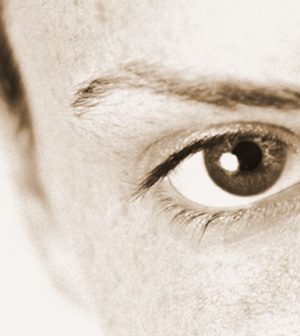- Recognizing the Signs of Hypothyroidism
- 10 Strategies to Overcome Insomnia
- Could Artificial Sweeteners Be Aging the Brain Faster?
- Techniques for Soothing Your Nervous System
- Does the Water in Your House Smell Funny? Here’s Why
- Can a Daily Dose of Apple Cider Vinegar Actually Aid Weight Loss?
- 6 Health Beverages That Can Actually Spike Your Blood Sugar
- Treatment Options for Social Anxiety Disorder
- Understanding the Connection Between Anxiety and Depression
- How Daily Prunes Can Influence Cholesterol and Inflammation
Severe COVID-19 Linked With Changes in Eyes of Survivors

Severe eye abnormalities have been found in the eyes of some COVID-19 patients, a new study out of France contends.
The findings show the need for eye screening, as well as appropriate treatment and management of potentially serious eye problems in these patients, experts say.
“We showed that a few patients with severe COVID-19 from the French COVID-19 cohort had one or several nodules of the posterior pole of the [eye’s] globe,” explained study lead author Dr. Augustin Lecler, a neuroradiologist at the Foundation Adolphe de Rothschild Hospital in Paris.
One U.S. ophthalmologist unconnected to the study explained that these nodules appeared in a portion of the eye’s globe called the macula.
“The macula is the area of the retina responsible for central vision,” said Dr. Mark Fromer, who practices at Lenox Hill Hospital in New York City. “The retina is easily evaluated by a retina specialist using magnifying lenses at the bed side.”
At this point in time, he said it’s not yet clear whether the eye changes are directly linked to COVID-19 or to its treatment, such as intubating severely ill patients and putting them on a ventilator.
As the Paris team explained, while the coronavirus that causes COVID-19 primarily affects the lungs, it’s been linked with an increased risk for eye conditions such as conjunctivitis (pink eye) and retinopathy, a disease of the retina that can result in vision loss.
There have been reports of eye abnormalities detected on MRI exams of COVID-19 patients, but there’s only been limited investigation into the types and rates of such eye problems.
To learn more, the French Society of Neuroradiology conducted a study of 129 patients with severe COVID-19 who underwent brain MRIs.
Nine (7%) of the patients had one or more nodules in the back part of the eyeball. All had nodules in the macular region, and eight had nodules in both eyes. Eight of the nine patients had COVID-19 so severe that they had to spend time in ICUs.
The new findings were published Feb. 16 in the journal Radiology.
“This is the first time these findings have been described using MRI,” Lecler noted in a journal news release.
The researcher said that severe eye problems might be missed in COVID-19 patients in hospital ICUs because they’re often being treated for much more severe life-threatening conditions.
“Our study advocates for screening of all patients hospitalized in the ICU for severe COVID-19,” Lecler said. “We believe those patients should receive specific eye-protective treatments.”
Dr. Claudia Kirsch is chief of neuroradiology at Northwell Health in New Hyde Park, N.Y. Reading over the new findings, she agreed that “clinicians treating COVID patients must ensure the orbits [eyes] are protected. As we start to recognize how the virus affects different organs in patients with COVID-19, including the eyes, we can hopefully better understand the disease mechanisms and work to improve outcomes for all patients afflicted during the ongoing pandemic.”
More information
The U.S. Centers for Disease Control and Prevention has more on COVID-19.
SOURCES: Mark Fromer, MD, ophthalmologist, Lenox Hill Hospital, New York City; Claudia Kirsch, MD, division chief, neuroradiology, Department of Radiology, Northwell Health, New Hyde Park, N.Y.; Radiology, news release, Feb. 16, 2021
Source: HealthDay
Copyright © 2026 HealthDay. All rights reserved.










